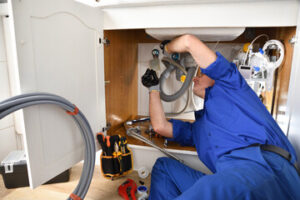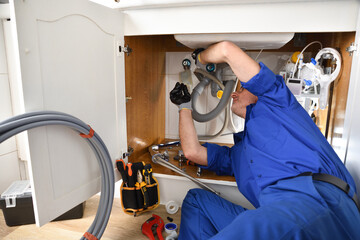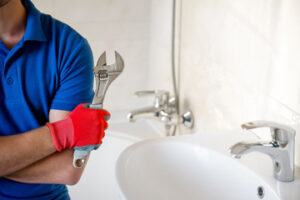Slow draining, clogged pipes, mysterious smells, and other plumbing issues can be an unpleasant experience for any homeowner. But Drain Cleaning Sarasota can help prevent these problems and keep your home healthy and smelling fresh.
Many people use baking soda and vinegar as a DIY drain cleaner. But is this effective?
Debris buildup is a common problem that affects drain pipes. Everything that goes down your drains — from soap scum to hair to food scraps and grease — can build up over time. This debris can prevent water from flowing through the pipes, causing blockages and other problems. Regular drain cleaning can reduce the amount of debris that builds up in your pipes and keep them running smoothly.
When a drain becomes clogged, it can cause problems throughout your entire house. You may notice that your shower or sink isn’t draining properly, or that there is standing water around your home. If left untreated, these problems can lead to severe clogs or pipe damage that will require expensive repairs.
A professional drain cleaner will use tools to get a look at your drainage system and identify the cause of the clog. They can also check for signs of more serious issues, such as a damaged pipe or a sewer backup. Whether the issue is a simple hair clog or a large tree root intrusion in your sewer line, drain cleaning professionals can fix it.
Clogged drains can become breeding grounds for mildew and mold. The stagnant water can also create a nutrient-rich environment for bacteria to grow. These organisms can cause health issues for you and your family. When you have a drain cleaning service come regularly, they can help prevent these organisms from taking over your drains and making them smell bad.
When you don’t have a drain cleaning service clean your drains on a regular basis, greasy soap scum, food scraps, and other waste can build up in your pipes and cause blockages. These blockages can be very difficult to remove without the help of a professional. A professional drain cleaning company can use different tools and methods to clear even the most stubborn clogs. They can use a cable machine to break up clumps of hair or paper wads and then use high-pressure jetters or flexible shaft machines to clear the rest of the clog.
Avoid using chemical drain cleaners, which can corrode your pipes and cause leaks or need for pipe replacement. These chemicals are also bad for the environment and can interrupt bacterial breakdown processes in septic systems.
Bacteria Growth
Clogged drains are perfect environments for the growth of bacteria, especially if there is food debris present. These bacteria can cause infections, particularly if they come into contact with your skin or if you have a compromised immune system. They can also cause unpleasant odors in your home. This is why it’s important to schedule regular drain cleaning services with a plumbing professional.
Studies have shown that large sessile populations of bacteria colonize domestic drain conduits. The bacterial composition of these biofilms varies between drains, and the species found in one drain can be very different from that of another.
The biofilms created by these clogged drains can lead to mold, insect infestations, and other problems that are difficult to deal with. Having your drains regularly cleaned by a plumber can help prevent these issues before they become serious problems.
In addition to drain cleaning, it’s important to maintain a regular schedule of regular maintenance for your entire plumbing system. This will help prevent clogs and keep your home clean and healthy.
Bacterial and other organisms can grow in a clogged drain if it is left untreated for too long, causing damage to the pipes and resulting in health problems for you and your family. These issues include bacterial infections such as campylobacteriosis and typhoid, respiratory conditions such as Legionnaire’s disease, and gastroenteritis caused by Helicobacter pylori.
There are a number of factors that affect how often drains should be cleaned, including age of the home and plumbing system, the number of people in the household, and how frequently the pipes are used. If you have an older home with original plumbing, you may need to have it cleaned more often than a newer house with updated plumbing. A plumbing professional can help you determine how often your drains should be cleaned and what kind of maintenance schedule would work best for your home. They can also help you schedule preventative maintenance, which can save you money and stress in the long run.
Sewage Buildup
Sewage is full of harmful bacteria and viruses that can make you sick if it comes into contact with your skin or if you breathe it in. It can also damage your floors, walls and furniture. If sewage backs up into your home, you must take immediate action to protect yourself and your family.
The first thing you should do is turn off any water in the affected area of your home, and shut off the electricity if possible if wastewater gets close to electrical outlets. This will help to reduce the risk of electrical fires and potential injuries caused by contact with contaminated water. You should also open windows and doors to ventilate the room and remove any items that have come into contact with sewage, such as clothing or towels.
If your drains seem to be draining slower than usual, this could be a sign that a blockage is developing in your sewer line. It might be possible to repair this yourself if you have one slow drain, but if waste begins backing up into other parts of your home, it is likely a much larger problem and should be dealt with immediately by a professional.
Some of the most common causes of a sewer line backup are food scraps, cooking grease, tree roots, sand and other solid debris that can build up in wastewater pipes and cause clogs. Older homes with older cast iron, cement or clay piping can also experience this issue as these materials can break down over time.
Other common reasons for a sewer backup include cracked or broken lines, which can be caused by age-related wear and tear, heavy rainfall or even tree root penetration. When these issues occur, sewage can flow into your home through the cracks and crevices of your pipes and cause major damage.
If your sewer lines are clogged, you may experience some nasty side effects that can impact the health of your family and pets. For example, a sewage backup can lead to mold growth, which can then create other problems like respiratory difficulties for those who suffer from allergies or asthma. The dirty water and toxins can also lead to intestinal problems and infections. Proper drain cleaning and maintenance can help to prevent these issues from occurring in your home.
Water Damage
Many drain cleaning services involve using tools that can be dangerous if not handled correctly. These include hydro-jetting, which uses upwards of 3500 psi of water flowing through specialty hoses and nozzles. This can be effective for most clogs, but it’s important to remember that it is extremely powerful and could damage older pipes made of materials such as lead or cast iron. If you’re planning on having this service performed, make sure to clear a path and remove any items that are easily damaged by water (e.g., furniture).
Some chemical drain cleaners are also harmful if ingested. Many of these cleaners are caustic and contain ingredients such as sulfuric acid or hydrochloric acid that can irritate the skin, eyes, and nose. These chemicals can also corrode metal pipes. If you have young children or pets in your home, it’s especially important to keep these products out of reach.
Clogged drains can cause serious problems for your home’s plumbing system, from a smelly odor to flooding and structural damage. Regularly cleaning your drains with a mixture of baking soda and vinegar can help prevent these issues.
Drain cleaning can be an expensive service, depending on how extensive the problem is. However, it’s much cheaper than repairing or replacing flood and water damage caused by faulty plumbing systems.
If you’re noticing a backup of waste or water in your home, contact us to schedule an appointment for drain cleaning. Our plumbing technicians can use video pipe inspection to find the source of your clog and recommend the best course of action.
While you can prevent most clogs by putting only biodegradable items down your drains, it’s still common for these substances to build up over time. To avoid these costly drain cleaning services, regularly clean your drains with a mixture of baking baking soda and vinegar and install a drain screen or guard to block unwanted debris. Also, be careful not to pour fats, oils, and grease down your drains, as these can lead to clogs. It’s best to dispose of these products in a trashcan or outside drainpipe instead of in your home’s plumbing system.



